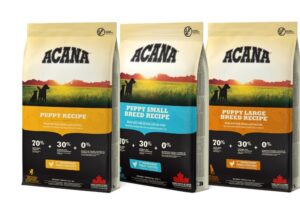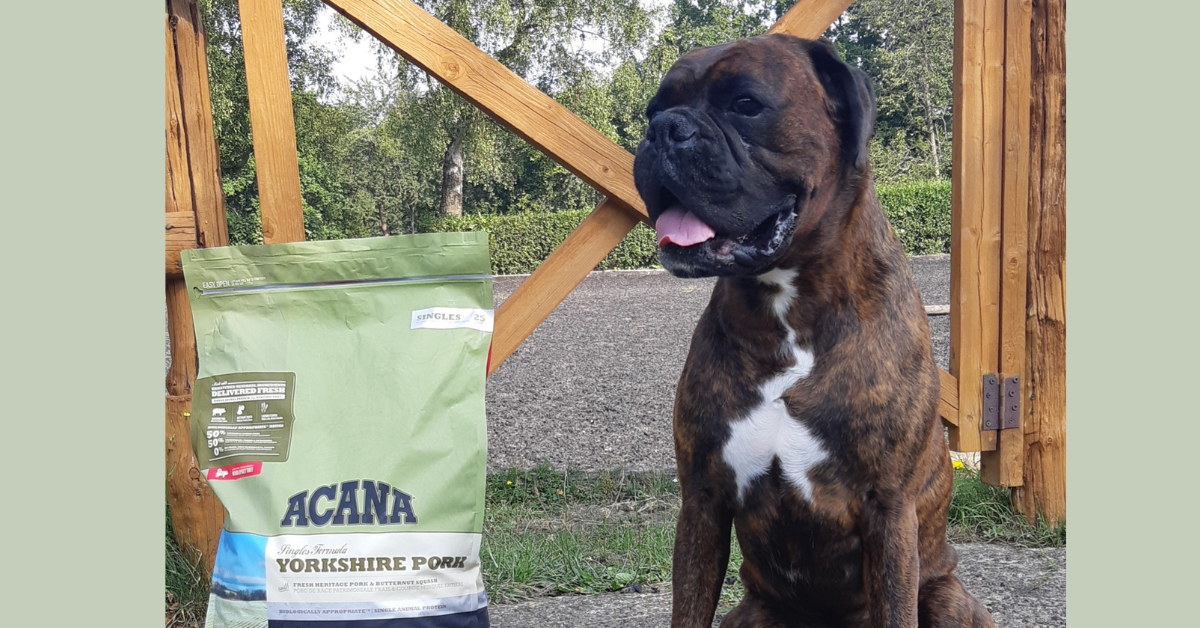Get to know one of our ACANA ambassadors as they share their favourite moments and the food they choose for all their adventures. Name of owner: West Midlands Fire

As an owner, ensuring your puppy receives the right nutrition is important for their growth and development. Puppies have different dietary needs compared to adult dogs, which is why feeding them a puppy specific diet will support their overall health. If your puppy occasionally helps themselves to your older dog’s food, this should be discouraged. Switching suddenly from one food to another is likely to cause digestive upset in the short-term. In the long-term, feeding an adult dog food could lead to nutritional deficiencies. Read on to learn more.
Key Differences Between Puppy Food and Adult Dog Food
There are key nutritional differences between puppy and adult food. Puppy food is formulated with ingredients that help nurture your puppy’s growth and development.
Puppy specific recipes are generally higher in calories as puppies have more energy at this life stage, usually running around and investigating their new home! In addition to higher calories, puppy diets are also formulated with the correct balance of protein, omega-rich fats and mineral content that help support muscle, bone and brain development, which are all essential nutrients.
Maintenance dog food is formulated for adult dogs once they have reached maturity and have stopped their bone growth stage. Adult food will not have the right balance of calories and nutrients for puppies. Likewise, feeding an adult dog puppy food is not appropriate and could lead to unwanted weight gain due to higher fat and calorie content.
When choosing a food for your puppy, check the manufacturers label for the FEDIAF Nutrient Profiles to ensure it is suited to your dog’s life-stage and size. For example, our ACANA Puppy Recipe is formulated to meet the nutritional levels established by the FEDIAF Dog Food Nutrient Profiles for growth except for growth of Great Dane puppies prior to 14 weeks.
Why Puppies Need Specialised Nutrition
A puppy’s growth phase is one of the most important stages of their life, as well as learning social skills and being exposed to new and exciting things in the world, ensuring the right nutrition from day one can help them grow into healthy adults.
Balancing the right amounts of protein, calories, and nutrients in their food is critical, which is why puppy food is formulated for their specialised needs.
Large and giant puppies, require a diet that supports their slow and steady development. Protein helps to support muscle mass, a calorie limited formula can support healthy weight combined with specific ratios of calcium and phosphorus to help reduce stress on developing bones and joints.
How to Choose the Best Food for Your Puppy
A growing puppy has different dietary needs to an adult dog, so picking a food that is formulated for puppies is a good starting point.
There are different factors to consider when choosing the right food for your puppy including ingredient quality and nutrients that are necessary for growth.
It is important to look for a food with quality ingredients like fresh or raw meat, poultry or fish balanced with whole vegetables and fruit. Make sure it is a complete food to ensure your puppy is getting all essential nutrients from their food. Consider the kibble size, smaller mouths may prefer a small bite.
ACANA Puppy recipes are made with 70%¹ quality animal ingredients like fresh Chicken and raw Hake, balanced with 30%¹ fruits and vegetables², like fresh whole pumpkin, greens, apples and pears. These recipes provide the nutrition and animal protein your puppy needs to thrive from when they are first introduced to kibble until they reach adulthood.

1Approximate and derived from the unprocessed state of the ingredients.
2We also add essential vitamins and minerals, natural preservatives and probiotics
Our included fresh ingredients use refrigeration as the sole method of preservation and our included raw ingredients are frozen at their peak freshness.
When Can Puppies Transition to Adult Dog Food?
Each puppy will develop at different rates. Small breeds tend to grow rapidly, reaching maturity around 10-12 months old. Large and giant pups take much longer to mature and can be on a puppy food typically until 16 – 24 months old.
The ACANA Puppy range includes three recipes specifically formulated for puppies from small to large breeds. Always make sure to read the feeding guide to ensure your puppy is being fed the right amount for their weight and age.
Once puppies finish growing, they will be ready to move onto their adult maintenance food. Transitioning to adult food should be a slow process, allowing 7-10 days to complete the switch. Start by mixing 25% of the new food with 75% of the old food. Then, gradually increase the new food until it makes up 100% of their meals. Always monitor your dog’s stools and slow the transition if needed.
Generally, when moving from puppy – adult food sticking to the same animal proteins will make for a smoother transition. However, every puppy is unique. If you need help choosing a recipe for your puppies’ specific requirements, please feel free to contact us.













